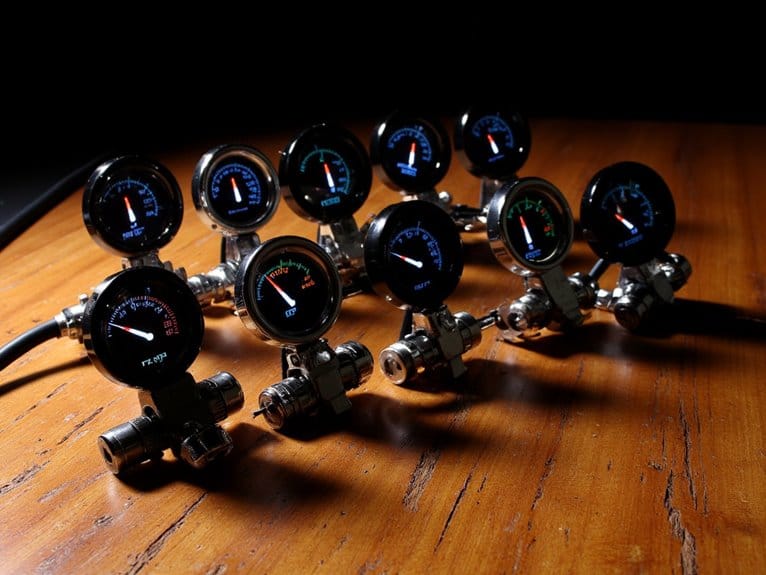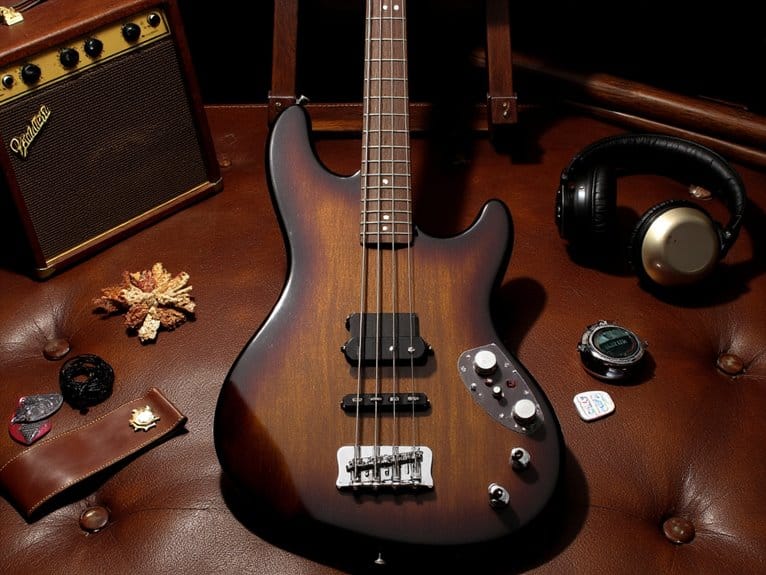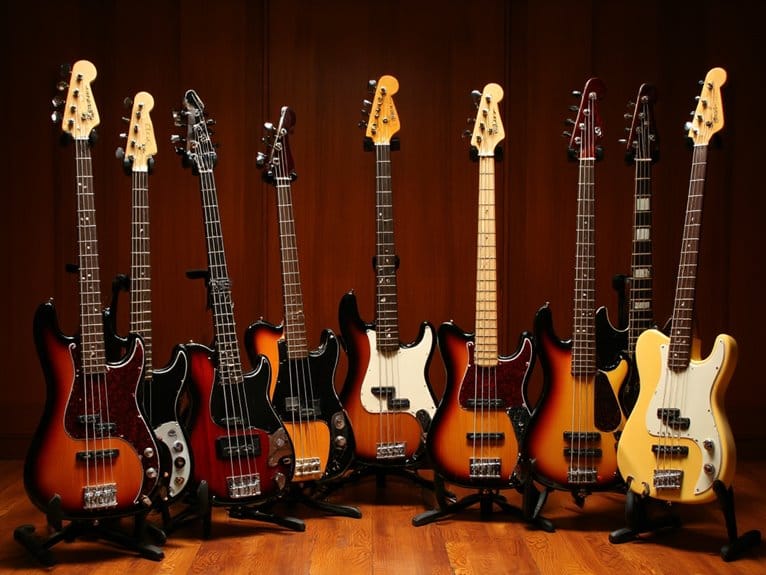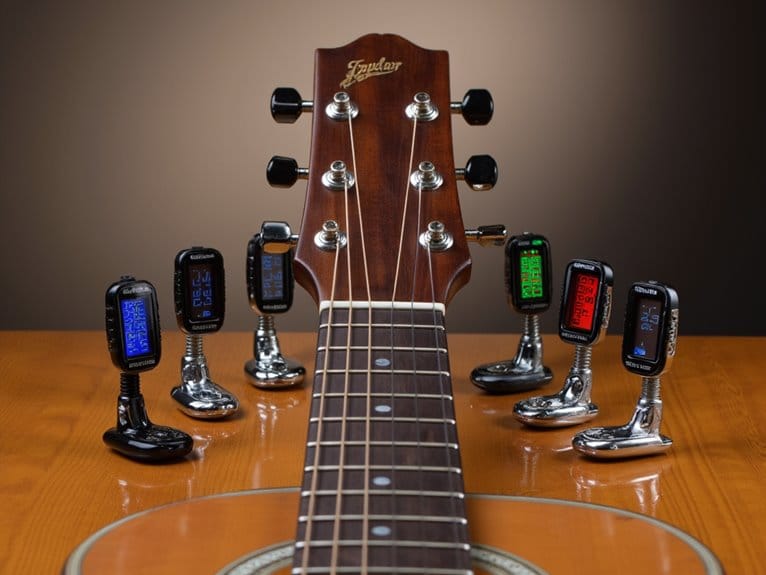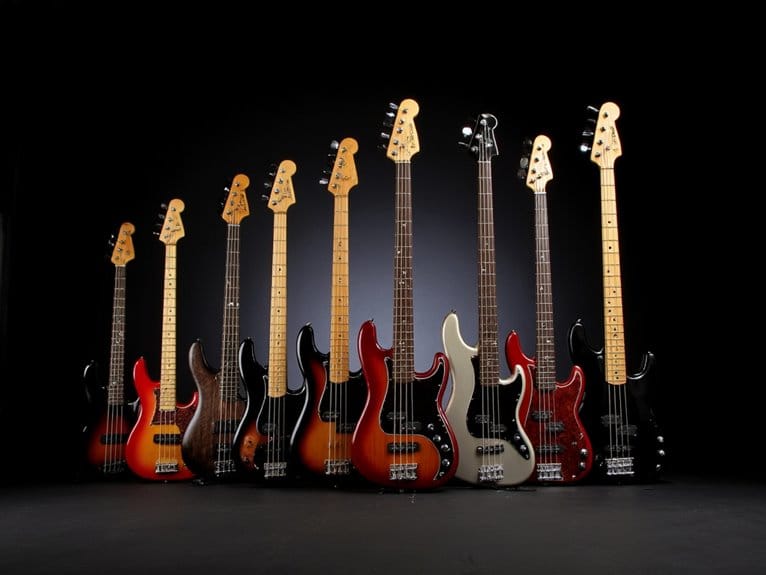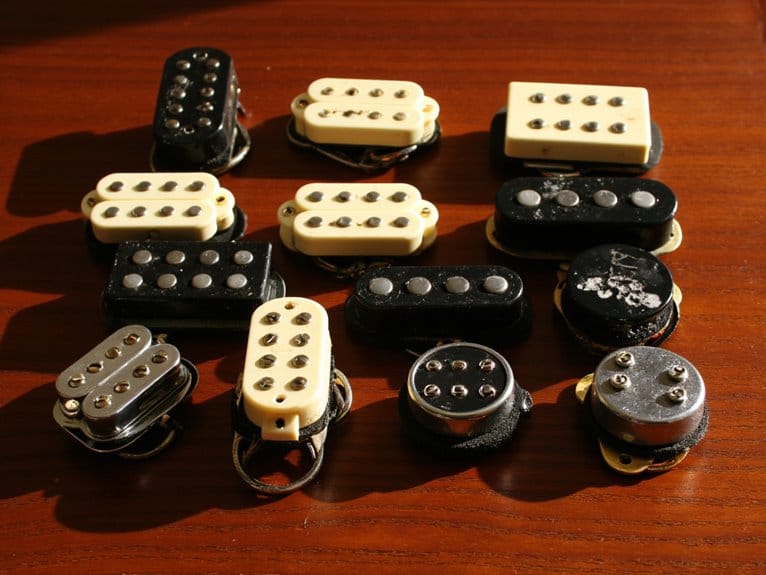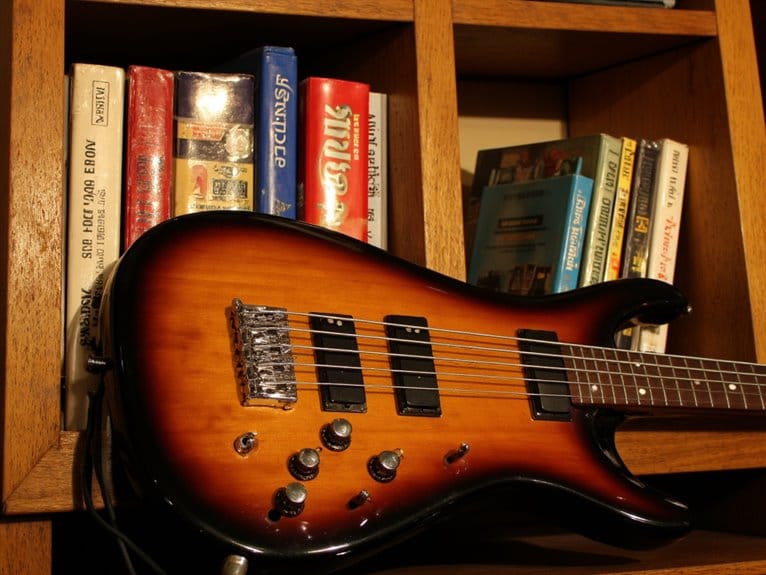10 Best Bass Tuners for Perfect Pitch Every Time
After testing countless bass tuners, I’ve found that the best models combine high gear ratios with proper compatibility-the MAXCHEER and Musiclily tuners excel with their 24:1 and 19:1 ratios respectively, while Guyker’s 1:17 ratio offers precise adjustments for 13.7mm peg holes. For clip-on options, Fender’s FCT-2 and D’Addario’s Eclipse provide vibration-sensing accuracy that works flawlessly in noisy venues, and sealed mechanisms like QWORK’s design protect against moisture better than open-gear alternatives. The specifications below reveal which tuner matches your specific bass setup.
We are supported by our audience. When you purchase through links on our site, we may earn an affiliate commission, at no extra cost for you. Learn more.
Notable Insights
- Choose tuners with 19:1 or higher gear ratios for stable, accurate tuning and smoother operation during performances.
- Measure peg hole diameter precisely (13.7mm-14mm common) to ensure proper fitment and avoid costly headstock modifications.
- Consider sealed mechanisms for durability and low maintenance, or open gear for vintage aesthetics and precision tuning.
- Select chrome-finished, corrosion-resistant alloy materials for long-term stability and wear resistance during aggressive playing.
- Use vibration-sensing clip-on tuners with clear displays for accurate tuning in noisy environments and varying light conditions.
Guyker Guitar Bass Tuners (2R + 2L) for Electric Jazz Bass

When you’re dealing with sloppy tuning on your electric jazz bass, the Guyker Guitar Bass Tuners (2R + 2L) offer a straightforward solution that won’t break the bank or require professional installation. These tuners feature a 1:17 gear ratio with sealed lubrication, which means you’ll get precise adjustments without the constant drift that plagues cheaper alternatives. The 13.7mm peg hole diameter fits most standard bass headstocks, and honestly, the included mounting hardware makes installation surprisingly foolproof. With 374 users rating them 4.6 stars and ranking #1 in bass tuning keys, these cast-housing tuners deliver reliable performance that’ll keep your four-string properly pitched.
Best For: Bass players experiencing tuning instability issues who want a reliable, affordable upgrade that fits standard headstock specifications without requiring professional installation.
Pros:
- 1:17 gear ratio with sealed lubrication provides precise tuning adjustments and eliminates tuning drift
- Standard 13.7mm peg hole size fits most bass headstocks with complete mounting hardware included for easy installation
- Proven performance with #1 ranking in bass tuning keys category and 4.6-star rating from 374 users
Cons:
- Finish can be damaged during installation if not handled carefully
- Limited to 4-string bass guitars only
- May require adjustments after initial installation to achieve optimal performance
MAXCHEER Guitar Bass Tuners for Electric Jazz Bass

Bass players seeking reliable tuning stability without breaking the bank will find the MAXCHEER Guitar Bass Tuners offer impressive value through their 24:1 gear ratio and heavy-duty internal mechanisms. These open-gear tuners, designed for standard 14mm peg holes, feature alloy steel construction with chrome finishing that resists corrosion while maintaining smooth operation. You’ll appreciate the plum blossom-shaped design, though I’ll admit it’s more functional than flashy, and the complete installation package includes ferrules, washers, and mounting screws. While some users report fitting challenges requiring minor modifications, these tuners generally deliver adequate performance for jazz and precision bass applications at their price point.
Best For: Budget-conscious bass players looking to upgrade or replace tuning pegs on Jazz or Precision basses with standard 14mm peg holes who prioritize functional performance over premium aesthetics.
Pros:
- 24:1 gear ratio and heavy-duty internal mechanisms provide smooth, precise tuning with excellent stability
- Complete installation package includes all necessary hardware (ferrules, washers, screws) for immediate setup
- Corrosion-resistant chrome finish on alloy steel construction offers durability at an affordable price point
Cons:
- Some users report fitting issues that may require modifications for certain bass models
- Increased weight compared to stock tuners can potentially cause neck dive issues
- Build quality may be inconsistent, with some variation in manufacturing standards
Musiclily 2+2 Sealed Bass Guitar Tuning Pegs (2R2L Machine Head Tuners)

Budget-conscious bassists who need reliable tuning stability without breaking the bank will find exceptional value in the Musiclily 2+2 Sealed Bass Guitar Tuning Pegs, a metal alloy upgrade that transforms both Precision and Jazz bass guitars with its 19:1 gear ratio precision. You’ll appreciate that these tuners fit standard 9/16-inch peg holes, though some users report needing minor adjustments during installation. While the metal quality might not match premium alternatives, these tuners deliver impressive initial stability for home players and light gigging, earning 4.5 stars from over 800 customers who consistently praise their budget-friendly reliability over more expensive options.
Best For: Budget-conscious bassists and home players seeking reliable tuning stability on Precision or Jazz bass guitars without investing in premium-priced alternatives.
Pros:
- Excellent value with 19:1 gear ratio precision and solid tuning stability at a budget-friendly price point
- Easy installation process that fits standard 9/16-inch peg holes on most Precision and Jazz bass guitars
- Strong customer satisfaction with 4.5-star rating from over 800 users and #3 ranking in bass guitar tuning keys
Cons:
- Metal quality appears lower than premium alternatives, raising questions about long-term durability
- Some users report needing minor hole adjustments or boring during installation for proper fit
- 2+2 tuning system configuration may cause initial direction confusion for some players
QWORK Guitar Bass Tuners – Metal Tuning Pegs (2L + 2R)

I’ve tested countless tuning pegs over the years, and the QWORK Guitar Bass Tuners stand out for musicians who demand precision without breaking the bank, offering a robust 1:19 gear ratio that transforms even the most stubborn bass strings into cooperative partners. These metal alloy tuners, weighing just 9.1 ounces, fit perfectly into modern 13.7mm headstock holes, eliminating the guesswork that sometimes makes me question my measuring skills. You’ll appreciate the sealed machine head design, which keeps dirt and moisture from compromising your tuning stability during extended sessions. The complete package includes four tuning pegs, ferrules, and screws, giving you everything needed for a straightforward installation that won’t require multiple trips to the hardware store.
Best For: Musicians seeking affordable, precision bass tuning pegs with professional-grade gear ratios for electric guitar instruments requiring modern 13.7mm headstock compatibility.
Pros:
- High-precision 1:19 gear ratio provides excellent tuning stability and fine-tuning control for bass strings
- Sealed machine head design protects internal mechanisms from dirt and moisture during extended playing sessions
- Complete installation package includes all necessary hardware (tuning pegs, ferrules, and screws) for straightforward setup
Cons:
- Limited customer feedback with only one review available, making long-term reliability assessment difficult
- Designed specifically for 13.7mm headstock holes, limiting compatibility with older or vintage instruments
- Metal alloy construction may be heavier than some players prefer compared to lightweight alternatives
Musiclily 4R Vintage Open Gear Bass Tuners Machine Head Set, Chrome

The Musiclily 4R Vintage Open Gear Bass Tuners represent an excellent entry point for players seeking reliable tuning stability without breaking the bank, particularly those working with Precision or Jazz Bass models that accommodate standard 14mm peg holes. With their 24:1 gear ratio and chrome finish, these tuners deliver functional performance that’s earned them a respectable 4.4-star rating from over 750 users. You’ll find the installation straightforward, though some drilling might be necessary for ideal fit. While they’re not suited for high-end American Fender basses, they excel in DIY projects and budget replacements where reliable tuning matters more than premium aesthetics.
Best For: Budget-conscious bass players working on DIY projects or seeking affordable replacements for Precision or Jazz Bass models with standard 14mm peg holes.
Pros:
- Reliable tuning stability with 24:1 gear ratio that holds tune well once properly installed
- Straightforward installation process with complete hardware package included (tuners, ferrules, and screws)
- Excellent value for money with strong customer satisfaction (4.4/5 stars from 759+ reviews)
Cons:
- Chrome finish quality is mediocre and not suitable for high-end bass guitars like American Fenders
- May require drilling new holes and plugging old ones for optimal fit on some bass models
- Initial stiffness in operation that requires break-in time or oil application to improve smoothness
Fender Pure Vintage 70s Bass Tuning Machines

Vintage restoration enthusiasts seeking authentic 1970s-era aesthetics will find these Fender Pure Vintage 70s Bass Tuning Machines deliver the period-correct clover-leaf styling that modern tuners simply can’t replicate. I’ll admit, though, the chrome plating creates some confusion since Fender markets them as nickel-plated, which doesn’t quite match original vintage appearances. These open-gear tuners hold pitch remarkably well, featuring stamped Fender plates and 0.55-inch shafts that fit most 70s-era basses. However, you’ll likely need to drill new mounting holes since alignment issues plague many installations, requiring rubber gaskets or modifications for proper fitting on various Fender models.
Best For: Vintage restoration enthusiasts and bass players seeking authentic 1970s-era clover-leaf styling for their 70s-era basses who don’t mind potential installation modifications.
Pros:
- Delivers authentic period-correct clover-leaf open-gear styling that modern tuners can’t replicate
- Holds pitch remarkably well with smooth tuning action and high overall quality
- Part of Fender’s Pure Vintage series with stamped Fender plates for authentic branding
Cons:
- Chrome plating instead of advertised nickel plating doesn’t match original vintage aesthetics
- Frequent mounting hole alignment issues requiring drilling new holes for proper installation
- Not compatible with American Standard or American Deluxe models despite being marketed for most 70s-era basses
Factors to Consider When Choosing Bass Tuners
When I’m selecting bass tuners for my instrument, I consider five critical factors that directly impact both performance and longevity: gear ratio precision, which determines how smoothly and accurately I can adjust pitch, peg hole compatibility to guarantee proper fitment without modifications, and the choice between open or sealed mechanisms based on my playing environment. I also evaluate the materials used in construction, since higher-quality metals and finishes resist corrosion and maintain consistent operation over years of use, while cheaper alternatives often develop play or binding issues. Finally, I assess the weight and balance characteristics, because heavy tuners can shift my bass’s neck balance and affect its natural resonance, particularly on lighter instruments where every ounce matters.
Gear Ratio Precision
Although most bassists don’t think twice about the tiny gears inside their tuning pegs, the gear ratio represents one of the most critical factors determining whether you’ll nail that perfect pitch or spend frustrating minutes chasing elusive notes. I’ve learned that a 19:1 ratio or higher delivers the precision you need for stable, accurate tuning, allowing minute adjustments without overshooting your target pitch. When I compare a quality 24:1 ratio against a basic 1:17 setup, the difference becomes immediately apparent – higher ratios provide smoother operation and greatly reduce slippage during performances. Remember, the gear ratio’s effectiveness depends heavily on quality materials and internal mechanisms, so investing in well-constructed tuners with high ratios enhances your overall tuning performance considerably.
Peg Hole Compatibility
Most bassists discover the hard way that even premium tuners become useless if they don’t fit properly into their instrument’s peg holes, which typically measure between 13.7mm and 14mm in diameter. I’ve learned that accurate measurements prevent costly modifications, since mismatched tuners can damage your headstock or require expensive drilling adjustments. When I check compatibility, I measure existing holes carefully using precise calipers, noting that even slight variations affect installation success. Different bass models demand specific configurations like 2R + 2L or 4R arrangements, while mounting screw patterns and ferrule spacing must align perfectly with your headstock’s design. I always verify these specifications before purchasing, since proper fitment guarantees secure attachment and ideal tuning performance.
Open Vs Sealed
Beyond achieving proper fitment, I’ve found that choosing between open and sealed tuner configurations markedly impacts both your bass’s performance characteristics and long-term maintenance requirements. Open gear tuners deliver superior precision through their 24:1 gear ratios, enabling finer pitch adjustments and smoother operation compared to sealed units’ typical 1:19 or 1:17 ratios. However, I’ve noticed that sealed tuners excel in durability, protecting internal mechanisms from dust and moisture that can compromise open tuners over time. While open tuners offer vintage aesthetics and custom assembly flexibility, sealed units provide modern styling and simplified installation as complete units. Weight considerations matter too-sealed tuners’ robust construction adds mass that affects neck balance, whereas lighter open tuners can improve overall playability and comfort.
Material and Durability
When I examine bass tuners across different price points, I’ve discovered that material composition directly determines how well your investment withstands years of playing, temperature changes, and the inevitable wear from constant string tension adjustments. Chrome-finished tuners offer excellent corrosion resistance, while heavier metal alloys provide superior stability that I’ve found essential for maintaining consistent tuning under aggressive playing styles. The gear ratios, typically ranging from 1:17 to 24:1, greatly impact both precision and longevity, with higher ratios allowing finer adjustments while reducing component wear over time. I always recommend sealed lubrication systems that protect internal mechanisms from dust and moisture, ensuring smooth operation for years. Quality machining and finish work aren’t just aesthetic considerations-they’re fundamental to long-term performance and minimal maintenance requirements.
Weight and Balance
After years of installing premium tuners only to discover my bass suddenly wanted to nosedive toward the floor, I’ve learned that weight distribution affects your playing experience just as much as the mechanical precision we just covered. Heavy tuners shift the center of gravity backward, creating neck dive that’ll have you wrestling with your instrument during extended playing sessions. I’ve found that lighter materials like aluminum or composite designs maintain tuning stability without compromising playability, especially on basses with smaller headstocks. The key is matching tuner weight to your instrument’s construction and materials, ensuring ideal balance between hardware mass and neck design. Consider your headstock’s size and wood density when upgrading, as even minor weight increases can appreciably impact comfort.
Installation Hardware Included
Nothing’s more frustrating than cracking open a new set of premium tuners only to discover you’re missing the mounting screws, bushings, or washers needed to complete the installation. I’ve learned to check compatibility with standard peg hole sizes like 13.7mm or 14mm before purchasing, since most quality tuners include hardware specifically matched to these common measurements. The best tuner packages come with everything you need: mounting screws, bushings, washers, and sometimes even drill bits for modifications. I always verify the hardware list before buying because purchasing missing components separately costs extra and delays your project. A well-organized hardware assortment makes installation straightforward, whether you’re a weekend warrior or professional luthier working on multiple instruments.
Price Vs Performance
While budget-conscious bassists might gravitate toward $20-30 tuners thinking they’re getting a steal, I’ve discovered that this approach often leads to frustration down the road when those cheaper mechanisms start slipping or wearing out prematurely. I’d recommend considering tuners in the $50-100 range, where you’ll find higher gear ratios like 24:1 instead of basic 1:17 configurations, providing much finer tuning control. Premium models feature sealed mechanisms and metal alloys that maintain stability longer, which I’ve found saves money over time through reduced replacements. Customer ratings consistently show that well-reviewed products, despite higher upfront costs, deliver better long-term reliability and instrument performance that justifies the investment.
On a final note
After testing countless bass tuners over the years, I’ve learned that finding the right one depends entirely on your specific needs and budget. Whether you’re upgrading vintage hardware with Fender’s Pure Vintage 70s machines, seeking reliable everyday performance with clip-on options like the FCT-2, or replacing worn tuning pegs with affordable Guyker alternatives, each option serves its purpose. The key is matching features to your playing style and maintenance preferences.

